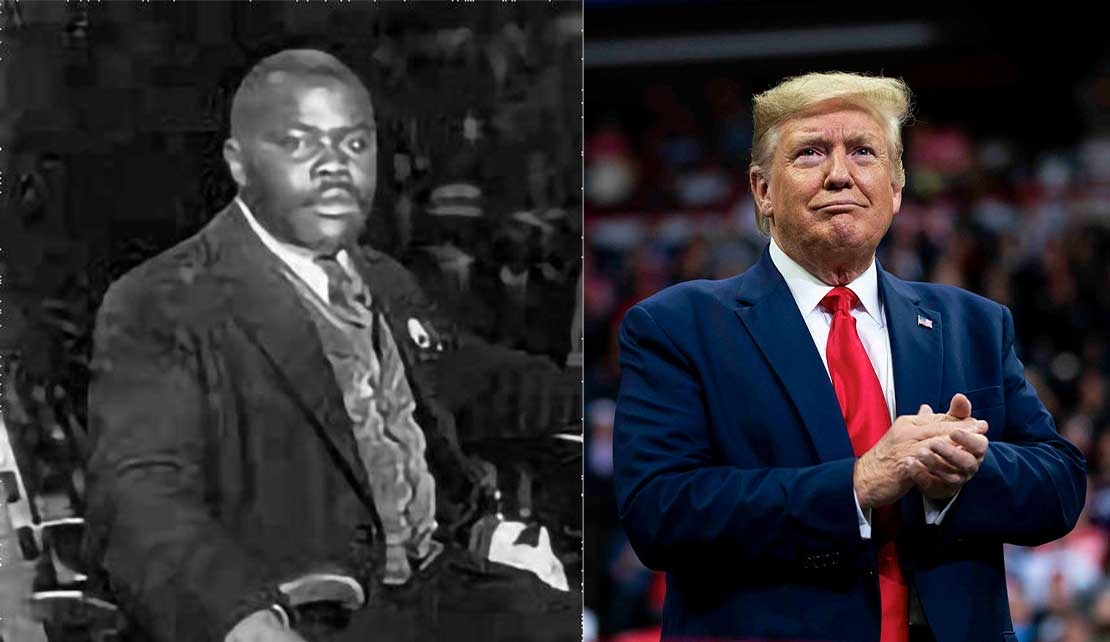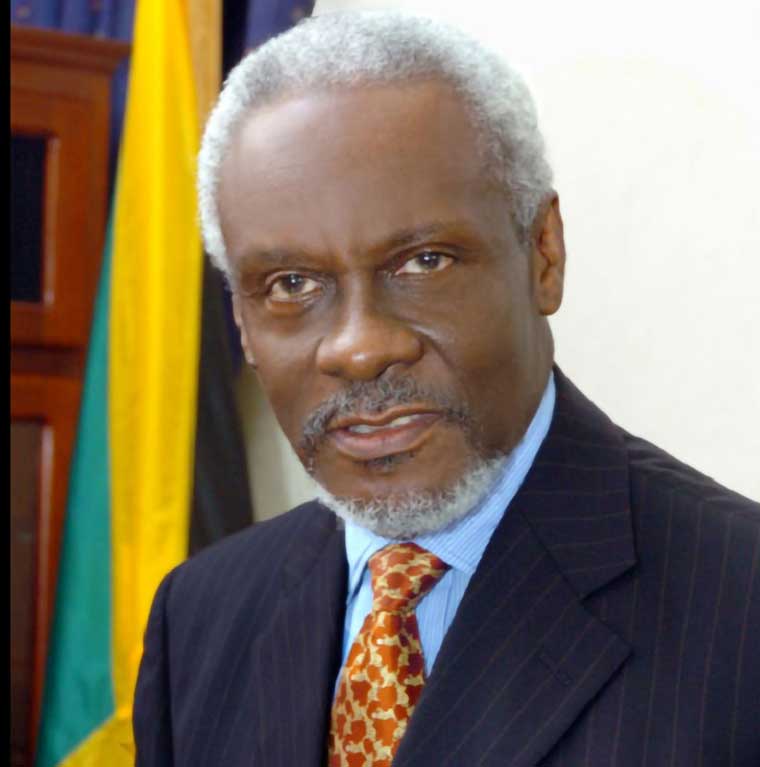JAMAICA | Mail Fraud? Of Marcus Garvey and Donald Trump

MONTEGO BAY, Jamaica, June 13, 2022 - It is more than 100 years ago since the injustice of the conviction of Marcus Garvey on a charge of mail fraud, and over the years, numerous efforts have been made to clear his name without success.
However, the developments at the January 6 committee hearings where evidence was led to reveal that former US president Donald Trump allegedly defrauded his donors by way of emails, to the tune of tens of million of dollars, should give pause to history scholars and legal luminaries who have been pursuing the case for the exoneration of Marcus Garvey.
“Not only was there the Big Lie, there was the Big Ripoff,” said Rep. Zoe Lofgren (D-Calif.) near the end of the Jan. 6 committee’s second hearing in laying out how the Donald Trump campaign scammed money from supporters over false claims of election fraud.
The former United States president pulled in $255.4 million in political donations from his supporters in the eight weeks following the 2020 election, to fund prospective legal challenges to the outcome of the elections, based on his specious claims of voter fraud.
The quarter of a billion dollar take was the result of “millions” of emails to Trump supporters about how they needed to “step up” to protect election integrity, according to the Jan. 6 committee in its deliberations on Monday.
The money would go to the non existent “Official Election Defense Fund” according to testimony in Monday’s public hearing of the January 6 congressional Committee.
The non-existent ‘fund’ raised a quarter of a billion dollars, most of which did not go to election litigation, but to Trump’s newly created Save America PAC. The PAC then made contributions to Mark Meadows’ charity, to a conservative organization employing former Trump staffers, to the Trump Hotel Collection, and to the company that organized the rally that preceded the attack on the Capitol last January 6.
“The evidence developed by the select committee highlights how the Trump campaign aggressively pushed false election claims to fundraise, telling supporters it would be used to fight voter fraud that did not exist,” said Amanda Wick, a lawyer for the Jan. 6 committee. “The emails continued through Jan. 6, even as Trump spoke on the Ellipse. Thirty minutes after the last fundraising email was sent, the Capitol was breached.”
Supporters who thought they were donating to “election integrity” instead saw some of their money funneled to Trump hotels.
In any language this constituted a monumental fraud, punishable by jail time.
But what if Trump was a Black man? What if he were Barack Obama? Would he have been given the latitude and free reign to corrupt and destroy the American political process which has been the envy of democracies the world over without so much as a slap on the wrist?
Let us juxtapose this against the experience of Marcus Garvey, the Jamaican born Black leader in the 1920’s whom many called Black Moses who lifted his voice against the savagery of an American people who claim to be dispensers of democracy.”
Where, according to Garvey, “for three hundred years the Negroes of America have given their life-blood to make the American Republic the first among the nations of the world, and all along this time there has never been even one year of justice”; where incidences of outright condemnation of innumerable instances of racial oppression, of lynching and burning as“crimes against the laws of humanity and a crime against the God of all mankind.”
Where “370,000 African-Americans, who had fought against Nazism and Fascism in Europe but returned home to face violence and racism in the riots of East St. Louis, of Chicago in 1919, of sharecroppers in Washington D.C., of the destruction of a black flourishing Town in Rosewood; which was ‘simply deplorable and untenable,’ and “In Tulsa, Oklahoma, where a prosperous black community had been razed to the ground by a white mob. - The white incendiaries were insisting that the sons and daughters of slaves existed to provide cheap labour to pick cotton and cut cane; not to build a Black Wall Street.”
As Garvey’s denunciation of these evils intensified, he raised funds to assist the victims of racial violence, as he started to publish the weekly ‘Negro World’ Newspaper and dared to launch ‘The African-Communities’ League’ to be a business arm of the UNIA.

Garvey’s oratorical skills, his passion for racial justice, his entry to the field of business and recruitment of black men and women to secure good. paying jobs in his Negro Factories Corporation, the enrolment of six million people worldwide as members of the U.N.I.A. were intolerable for White Supremacists and several agencies of the Federal Government’.
The series of events which followed, he pointed out, came as a result of a fear of Garvey’s power by the Bureau of Investigation and a resulting desire to expel him from the U.S.A.
“The powerful J. Edgar Hoover was determined to stop Garvey – by fair means or foul said Patterson, “engaged black spies to infiltrate the U.N.I.A. and indulged in extensive surveillance which was among the most aggressive in his infamous programmes against Leaders of the civil rights movement.”
After many failed attempts to find criminal wrong-doing and reasons to deport Garvey as an undesirable alien, “J. Edgar Hoover sought to imprison this man who had the audacity of launching The Black Star Line.
He indicted Garvey and three Directors on charges of “conspiracy to use the mail in furtherance of a scheme to defraud.”
According to Patterson, himself an eminent lawyer, in order to succeed in their case, the prosecutor must prove that mail was sent through the postal service from a post in the Southern District of New York by Marcus Garvey, or on his orders soliciting shares in a company which was defunct or bankrupt”.
He called into question, the evidence placed before the Trial Court pointing out a number of questionable actions positioned as evidence, involving a ‘questionable empty envelope’ bearing the Black Star line name - the only ‘proof’ the envelope, exhibit offered; as well as the forgetful witness; and no secondary evidence to support the envelope’s contents
“Where is the proof that it was mailed or caused to be mailed by Marcus Garvey? he asked. “What was in it, if anything? How can it be assumed that it contained fraudulent matter? How can the Jury be asked to speculate on the contents of this empty envelope? questioned Mr, Patterson.
There is not a scintilla of evidence that Garvey placed or caused to be placed in the mails the circular or letter described or referred to in this count of the indictment. How can any conviction turn on an empty envelope where its contents cannot be assumed or ascertained?
Arguing further, Mr. Patterson points out that “the Judge must have been unaware of two simple legal tenets or chosen to discard them: (i) He who asserts must prove. (ii) It is for the State to prove beyond reasonable doubt, what were the contents of the envelope and that they were inculpatory.
“For these compelling reasons, this global campaign is not begging for mercy, or pleading for pardon as Marcus Garvey committed no crime. Marcus Garvey deserves the support of every man and woman in every continent and island who loves justice and equality under the law”; claims Mr. Patterson
It is more than 100 years ago since this manifest act of injustice was perpetrated on Marcus Mosiah Garvey, a man whose only conviction was to ‘Get Up, Stand Up, Stand Up for your Rights; concluded Mr. Patterson in his argument for Garvey’s exoneration.
In looking back at the Trump allegations, CNN calculated that during the first month of Trump’s post-election battle, the president’s political operation sent out 414 fundraising appeals via email and 132 by text message. Hundreds more were sent before Jan. 6, with many directing supporters to an “Election Defense Fund,” according to a tracker of the emails.
Though the pitch in many of the messages was to help finance Trump’s unfounded—and ultimately unsuccessful—legal challenges to the election outcome, it’s unclear yet how much of the money actually went toward this cause.
Bloomberg reported that as of Dec. 4 the total spent on overturning the election by the Trump campaign was $8.8 million. The fine print at the bottom of some emails disclosed that large portions of the donations would go to Trump’s leadership PAC, Save America, which was created in the days after the election.
Unlike contributions to a regular PAC, money in leadership PACs can be used “to fund basically anything,” explains the Washington Post’s Philip Bump.
In the meantime, we await the end of the deliberations of the Congressional Committee in relation to the January 6 attempted coup, to see whether the former president will be charged in relation to his crimes .
-30-
